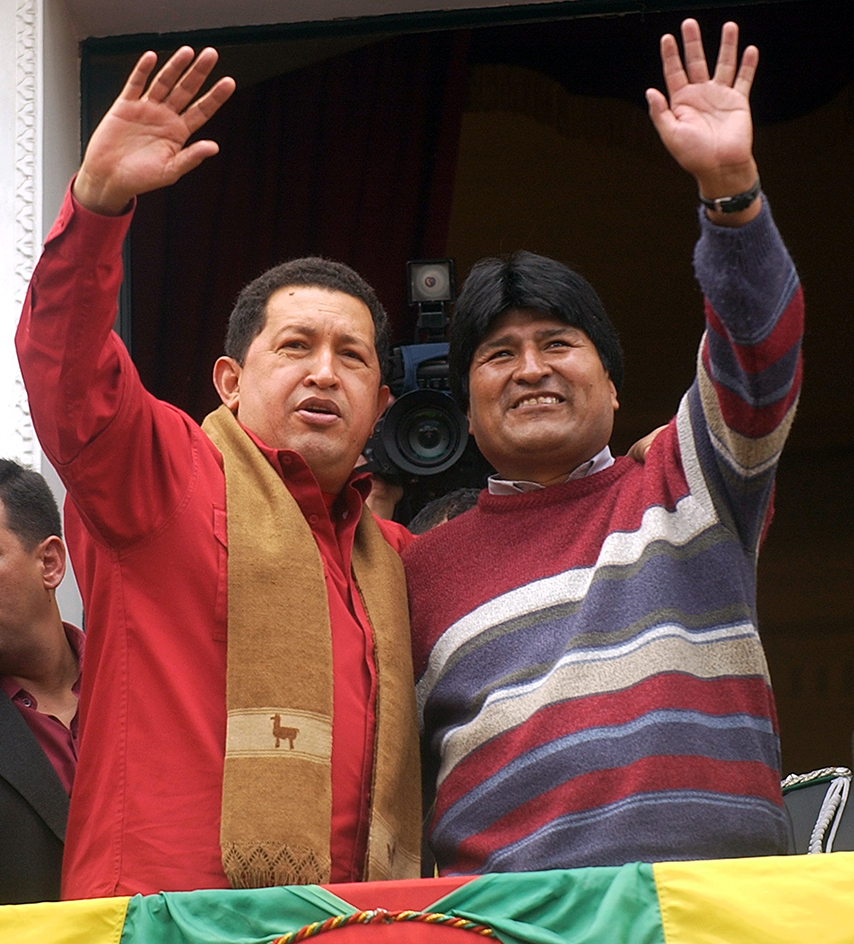Morales, Evo << moh RAH lays, AY voh >> (1959-…), served as president of Bolivia from 2006 to 2019. Morales was the country’s first indigenous (native) president. He is of Aymara descent. Morales also has headed Bolivia’s main coca growers’ federation.

Morales has supported greater rights for Bolivia’s indigenous population, government control of energy resources, and fewer restrictions on coca growing. Many people in Bolivia chew coca leaves or drink tea made from them. However, coca is also the plant from which the illegal drug cocaine is made. Morales also has opposed economic policies promoting free trade between Latin America and the United States.
Juan Evo Morales Ayma was born on Oct. 26, 1959, in Isallavi, Bolivia, a poor community in the Andes Mountains . As a youth, he worked as a llama herder, bricklayer, baker, and trumpet player. Morales attended high school in the city of Oruro. In the early 1980’s, his family moved to the lowland Chapare region of the province of Cochabamba to escape a severe drought. There, Morales became a coca grower. In 1983, Morales became an officer of his local coca growers’ union. He was elected president of a regional federation of coca growers in 1996.
In 1995, Morales helped found an indigenous party that later became known as Movimiento a Socialismo (Movement Toward Socialism, or MAS). He won election to Bolivia’s Congress in 1997 and narrowly lost the 2002 presidential race to Gonzalo Sánchez de Lozada. In late 2003, Morales participated in major public protests after President Sánchez de Lozada announced a plan to export natural gas to North America. These and other protests resulted in the resignations of Sánchez de Lozada and his successor, President Carlos Mesa.
Morales was elected president by a large margin on Dec. 18, 2005. He took office on Jan. 22, 2006. In 2009, Bolivia adopted a new constitution intended to give indigenous people a greater political voice. The Constitution also lifted a ban on consecutive term limits, and Morales was reelected in 2009. He was elected once again in 2014, although the Constitution limited presidents to two consecutive terms.
In a 2016 referendum (direct vote by the people), Bolivians rejected constitutional changes that would have allowed Morales to run for a fourth term. But the following year, the Constitutional Court ruled that term limits for elected officials violated candidates’ human rights. Morales ran again in 2019 and was declared the winner.
Violent protests broke out after the election. Morales’s opponents accused the government of meddling with election results. An international group, the Organization of American States, reported evidence of tampering, and the chief of Bolivia’s armed forces called upon Morales to step down. Morales resigned and accepted political asylum in Mexico, and then in Argentina. Bolivia’s interim government annulled (canceled) the 2019 election results and barred Morales from running for president again. Morales returned to Bolivia in 2020, after MAS party candidate Luis Arce was elected president.
